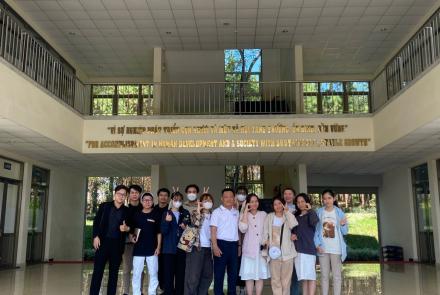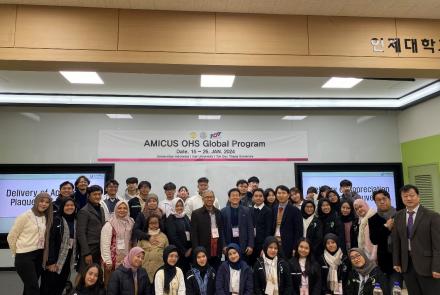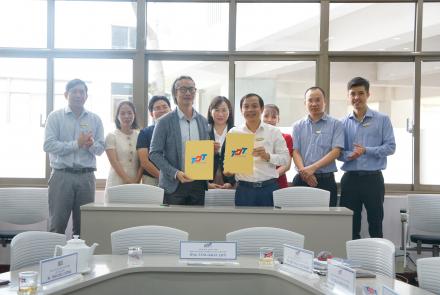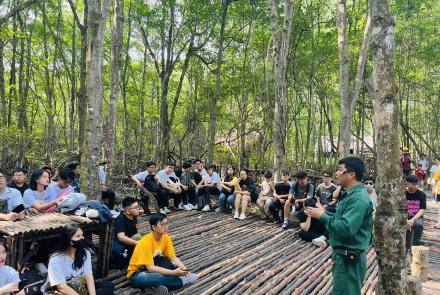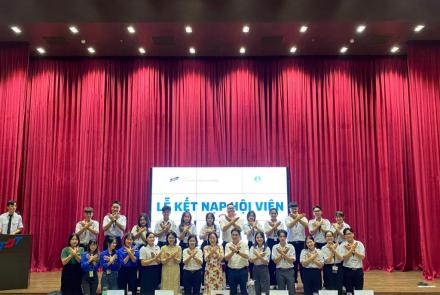OCCUPATIONAL SAFETY AND HEALTH
- 1. Overview of Department of Occupational Safety and Health
-
1.1. Introduction
In Vietnam, Labor safety is the field of study founded by Ton Duc Thang University. The Department of Occupational Safety and Health (DEOSH) provides well-qualified human resources that have specialized knowledge about Mechanical Safety; Electrical Safety; Chemical Safety; Fire Prevention, Occupational Health, Occupational Physiology; Ergonomics; National and International Standards on Occupational Safety and Health; Occupational Safety and Health Management System (OSHMS);… . Graduates are capable of working on Occupational Safety and Health Department; Assessment of Labor Risks; monitoring and improving working conditions for employees; establishing, implementing and improving occupational safety and health management systems based on national and international standards.
The Training Program is based on the curriculum framework of the University of Queensland, Australia being in the world’s top 100 universities.
1.2. Career opportunities
According to current statistics, 100% graduates work in a field related to their majors; 50% of students get a job when they are in the last year of college or ordered by enterprises. Yearly, more than 55 businesses contacted to recruit personnel. Moreover, more than 80% of businesses feel satisfied with training quality and graduate’s specialist knowledge. The Occupational Safety and Health Engineer can work in all production enterprises, multinational corporations, construction projects and state management agencies in terms of occupational safety and health.
Have an opportunity to get a good salary and for career advancement in foreign-invested companies and multinational corporations. Construction projects.
Graduated students from Occupational Safety and Health Engineer, Ton Duc Thang University are always the priority of state agencies and companies such as Holcim LTD, Intel Corporation, Kimberly Clark Group, Hoa Sen Group, PetroVietnam Technical Services Corporation (PTSC), Hoa Binh Corporation, Coteccons, Unicons, Kinden Vietnam, FrieslandCampina Vietnam, Vinamilk company, etc.
- Consulting firm on international standards on quality management.
- Research institutes of Occupational Safety and Health.
- State management agencies over Occupational Safety and Health.
- 2. Expected learning outcomes
-
The expected learning outcomes (ELOs) reflect the mission and vision of the university to train high quality human resources, contribute effectively the human development and Viet Nam development to be prosperous, stable and sustainable. The building of the expected learning outcomes and the development of Occupational Safety and Health programme are based on the requirements of the stakeholders, such as Ministry of Education, Employers, Alumni, Lecturers, Students. ELOs are committed by the Ton Duc Thang University (TDTU) publicized on the Website to learners and society.
Name of programme: Occupational Safety and Health
Level: Undergraduate
Programme code: 7850201
Training degree: Engineer (5 years); Bachelor (4 years)
Mode of study: Full time
Expected learning Outcomes (ELOs):
No.
Description
Generic Learning Outcomes
Specific Learning Outcomes
ELO1
Applying the systematically knowledge of foreign language and information technology (with IELTS 5.5 (Engineer) and 5.0 (Bachelor) or equivalent and MOS Certificate 750 points), philosophy; political theory, natural and social science.
X
ELO2
Demonstrating effective teamwork, systemic thinking skills, creative thinking skills, independent working skills and effective communication skills through writing and presenting reports.
X
ELO3
Demonstrating professional ethics, social responsibility and awareness of environmental protection, active participation in community activities.
X
ELO4
Analysing and applying the laws and systems of legal documents, knowledge of human biological principles and health behaviors to consult the occupational safety and health at enterprises, and provide the administrative services of occupational safety and health for businesses.
X
ELO5
Identifying optimal solutions in waste minimization and pollution prevention techniques based on basic principles, principles of application and business conditions.
X
ELO6
Applying the knowledge of waste minimization and pollution prevention, sustainable production practices, and interventions in occupational safety and health at enterprises.
X
ELO7
Consulting and proposing the services on labour safety and sanitation, occupational safety and health for businesses and risk assessment and control solutions as well.
X
ELO8
Developing education and communication programs on labour safety and sanitation, occupational safety and health in accordance with the Law and Policy on Occupational Safety and Health.
X
ELO9
Designing the systems of environmental pollution control, chemical safety equipment, and high pressure equipment; and systems of working on high buildings and in confined spaces.
X
ELO10
Applying scientific research achievements at works and developing new research directions in use of natural resources or ways to ensure occupational safety and health.
X
Program Objectives (POs):
- Programme objective 1 (PO1): graduates have a solid background in both theory and practice and excel in careers in the occupational safety and health field to be able to integrate and develop in the national and international labour markets.
- Programme objective 2 (PO2): graduates display a high level of systematic thinking, independent working skills, creative thinking skills and the capability of proposing research ideas and conducting research in the field of occupational health and safety.
- Programme objective 3 (PO3): graduates will pursue advanced degrees for a career in occupational safety and health, be engaged in lifelong learning and demonstrate a high level of professionalism, ethical and social responsibility in the process of international development and integration.
- 3. Education program
-
The programme objectives are to train students to have the solid knowledge background in both theory and practice, the independent working skills, a creative thinking to be able to integrate and develop in the labor market of Vietnam and the world that requires the highly qualified. Students have the research skills, the scientific manners, the ability to propose research ideas, and the systematic thinking ability in the area of Safety, Health, and Environment. Students have the sense of learning and improving their knowledge in the spirit of lifelong learning; have the professional manners and attitudes in the multinational environment; have the responsibility to protect the health and safety of workers in the process of development and international integration.
At the end of each semester, according to the procedures of compiling and editing the course specification of TDTU, all course specification of DEOSH program will be considered to improve. This process is normally conducted every 2 years. However, in the special cases, when the stakeholders (e.g. students, lecturers, imployers, and alumni) raise any request, for instance, the Head of DOSH will submit a proposal to the Dean who then show further suggestion to the University Board for asking the approval. The course specification is then allowed to be reviewed and adjusted. Finally, the outline will be approved by the University Board and put into operation to replace the expried one. The training program of Top 100 universities has been applied from the academic year 2015 – 2016 to train human resources who meet the labour market and global integration trend, and help learners more active and self-study.
Education Program of DEOSH: See attached file
- Log in to post comments


